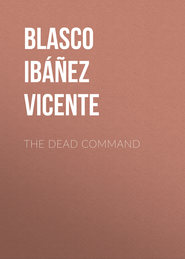По всем вопросам обращайтесь на: info@litportal.ru
(©) 2003-2024.
✖
Woman Triumphant (La Maja Desnuda)
Настройки чтения
Размер шрифта
Высота строк
Поля
The doctor would smile, flattered at the atmosphere of worship with which the countess surrounded him.
He had written a book on the natural origin of animal organism, of which the fair countess spoke enthusiastically. The painter observed this change in her tastes with surprise and envy. No more music, nor verses, nor plastic arts which had formerly occupied her flighty attention, that was attracted by everything that shines or makes a noise. Now she looked on the arts as pretty, insignificant toys that were fit to amuse only the childhood of the human race. Times were changing, people must be serious. Science, nothing but science; she was the protectress, the good friend, the adviser of a scholar. And Renovales found famous books on the tables and chairs, feverishly run through and laid aside because she grew tired of them or could not understand them after the first impulse of curiosity.
Her coterie, almost wholly composed of old gentlemen attracted by the beauty of the countess, and in love with her though without hope, smiled to hear her talking so weightily about science. Men who were prominent in politics admired her frankly. How many things that woman knew! Many that they did not know themselves. The others, well-known physicians, professors, lawyers, who had not studied anything for years, approved complacently. For a woman it was not at all bad. And she, lifting her glasses to her eyes from time to time to relish the doctor's beauty, talked with a pedantic slowness about protoplasms, and the reproduction of the cells, the cannibalisms of the phagocytes, catarine, anthropoid and pithecoid apes, discoplacentary mammals and the Pithecanthropos, treating the mysteries of life with friendly confidence, repeating strange scientific words, as if they were the names of society folks, who had dined with her the evening before.
The handsome Doctor Monteverde, according to her, was head and shoulders above all the scholars of universal reputation.
Their books made her tired, she could not make anything out of them, in spite of the fact that the doctor admired them greatly. To make up for this, she had read Monteverde's book over and over, and she recommended this wonderful work to her lady friends, who in matters of reading never went beyond the novels in popular magazines.
"He is a scholar," said the countess one afternoon while talking alone with Renovales. "He's just beginning now, but I will push him ahead and he will turn out to be a genius. He has extraordinary talent. I wish you had read his book. Are you acquainted with Darwin? You aren't, are you? Well, he is greater than Darwin, much greater."
"I can believe that," said the painter. "Your Monteverde is as pretty as a baby and Darwin was an ugly old fellow."
The countess hesitated whether to get serious or to laugh, and finally she shook her lorgnette at him.
"Keep still, you horrid man. After all, you're a painter. You can't understand tender friendships, pure relations, fraternity based on study."
How bitterly the painter laughed at this purity and fraternity! His eyes were good and Concha, for her part, was no model of prudence in hiding her feelings. Monteverde was her lover, just as formerly a musician had been, at a period when the countess talked of nothing but Beethoven and Wagner, as if they were callers, and long before that a pretty little duke, who gave private amateur bull-fights at which he slaughtered the innocent oxen after greeting lovingly the Alberca woman, who, wrapped in a white mantilla, and decorated with pinks, leaned out of the box in the grandstand. Her relations with the doctor were almost common talk. That was amply proved by the fury with which the gentlemen of her coterie pulled him to pieces, declaring that he was an idiot and that his book was a Harlequin's coat, a series of excerpts from other men, poorly basted together, with the daring of ignorance. They, too, were stung by envy, in their senile, silent love, by the triumph of that stripling who carried off their idol, whom they had worshiped with a contemplative devotion that gave new life to their old age.
Renovales was angry with himself. He tried in vain to overcome the habit that made him turn his steps every afternoon toward the countess's house.
"I'll never go there again," he would say when he was back in his studio. "A pretty part you're playing, Mariano! Acting as a chorus to a love duet, in the company of all these senile imbeciles. A fine aim in life, this countess of yours!"
But the next day he would go back, thinking with a sort of hope of Monteverde's pretentious superiority, and the disdainful air with which he received his fair adorer's worship. Concha would soon get tired of this mustached doll and turn her eyes on him, a man.
The painter observed the transformation of his nature. He was a different man, and he made every effort to keep his family from noticing this change. He recognized mentally that he was in love, with the satisfaction of a mature man who sees in this a sign of youth the budding of a second life. He had felt impelled toward Concha by the desire of breaking the monotony of his existence, of imitating other men, of tasting the acidity of infidelity, in a brief escape from the stern imposing walls that shut in the desert of married life which was every day covered with more brambles and tares. Her resistance exasperated him, increasing his desire. He was not exactly sure how he felt; perhaps it was merely a physical attraction and added to that the wound to his pride, the bitterness of being repelled when he came down from the heights of virtue, where he had held his position with savage pride, believing that all the joys of the earth were waiting for him, dazzled by his glory and that he had only to hold out his arms and they would run to him.
He felt humiliated by his failure; a dumb rage filled him when he compared his gray hair and his eyes, surrounded by growing wrinkles, with that pretty boy of science who seemed to drive the countess insane. Women! Their intellectual interest, their exaggerated admiration of fame! A lie! They worshiped talent only when it was well presented in a young and beautiful covering.
Impelled by his obstinacy, Renovales was determined to overcome the resistance. He recalled, without the least remorse, the scene with his wife in the bedroom, and her scornful words that foretold his failure with the countess. Josephina's disdain was only another spur to urge him to continue his course.
Concha kept him off and led him on at the same time. There was no doubt that the master's love flattered her vanity. She laughed at his passionate protestations, taking them in jest, always answering them in the same tone: "Be dignified, master. That isn't becoming to you. You are a great man, a genius. Let the boys be the ones to play the part of the lovesick student." But when enraged at her subtle mockery, he took a mental oath not to come back again, she seemed to guess it and she suddenly assumed an affectionate air, attracting him with an interest that made him foresee the near approach of his triumph.
If he was offended and kept silence, she was the one who talked of love, of eternal passions between two beings of lofty minds, based on the harmony of their thoughts; and she did not cease this dangerous conversation until the master, with a sudden renewal of confidence, came forward offering his love, only to be received with that kindly and still ironical smile that seemed to look on him as a child whose judgment was faulty.
And so the master lived, fluctuating between hope and despair, now favored, now repelled, but always incapable of escaping from her influence, as if a crime were haunting him. He sought opportunities to see her alone with the ingenuity of a college boy, he invented pretexts for going to her house at unusual hours, when there were no callers present, and his courage failed him when he ran into the pretty doctor and felt around himself that sensation of uneasiness which always seizes an unwelcome guest.
The vague hope of meeting the countess at Moncloa, of walking with her a whole afternoon, unmolested by that circle of insufferable people who surrounded her with their drooling worship, kept him excited all night and the next morning, as if a real rendezvous were awaiting him. Would she go? Was not her promise a mere whim that she had immediately forgotten? He sent a note to an ex-minister of State, whose portrait he was painting, to ask him not to come to the studio that afternoon, and after luncheon he got into a cab, telling the cabby to beat the horse, to go full speed, for fear of being late.
He knew that it would be hours before she came, if she did come; but a mad, unreasonable impatience filled him. He thought without knowing why that, by arriving ahead of time, he would hasten the countess's coming.
He got out in the square in front of the little palace of Moncloa. The cab disappeared in the direction of Madrid, up hill along an avenue that was lost in the distance behind an arch of dry branches.
Renovales walked up and down, alone in the little square. The sun was shining in a patch of blue sky, among the heavy clouds. In the places which its rays did not reach, it was cold. The water ran down from the foot of the trees, after dripping from the branches and trickling down the trunks; it was melting rapidly. The wood seemed to weep with joy under the caress of the sun, that destroyed the last traces of the white shroud.
The majestic silence of Nature, abandoned to its own power, surrounded the artist. The pines were swinging with the long gusts of wind, filling space with a murmur, like the sound of distant harps. The square was hidden in the icy shadow of the trees. Up above in the front of the palace some pigeons, seeking the sun above the tops of the pines, swept around the old flagpole and the classic busts blackened by the weather. Then, tired of flying, they settled down on the rusty iron balconies, adding to the old building a white fluttering decoration, a rustling garland of feathers. In the middle of the square a marble swan, with its neck violently stretched toward the sky, threw out a jet, whose murmur seemed to heighten the impression of icy cold which he felt in the shadow.
Renovales began to walk, crushing the frozen crust that cracked under his feet in the shady places. He leaned over the circular iron rail that surrounds a part of the square. Through the curtain of black branches, where the first buds were beginning to open, he saw the ridge that bounds the horizon; the mountains of Guadarrama, phantoms of snow that were mingled with the masses of clouds. Nearer, the mountains of Pardo stood out with their dark peaks, black with pines, and to the left stretched out the slopes of the hills of the Casa de Campo, where the first yellow touches of spring were beginning to show.
At his feet lay the fields of Moncloa, the antique little gardens, the grove of Viveros, bordering the stream. Carriages were moving in the roads below, their varnished tops flashing in the sun like fiery mortar boards. The meadows, the foliage of the woods, everything seemed clean and bright after the recent storm. The all-pervading green tone, with its infinite variations from black to yellow, smiled at the touch of the sun after the chill of the snow. In the distance sounded the constant reports of shotguns that seemed to tear the air with the intensity that is common in still afternoons. They were hunting in the Casa de Campo. Between the colonnades of trees and the green sheets of the meadows, the water flashed in the sun, bits of ponds, glimpses of canals, pools of melted snow, like bright trembling edges of huge swords, lost in the grass.
Renovales hardly looked at the landscape; it had no message for him that afternoon. He was preoccupied with other things. He saw a smart coupé come down the avenue, and he left the belvedere to go to meet it. She was coming! But the coupé passed by him, slowly and majestically without stopping and he saw through the window an old lady wrapped in furs, with sunken eyes and distorted mouth, trembling with old age, her head bobbing with the movement of the carriage. It disappeared in the direction of the little church beside the palace and the painter was alone again.
No! She would not come! His heart began to tell him that there was no use waiting.
Some little girls, with battered shoes, and straight greasy hair that floated around their necks, began to run about the square. Renovales did not see where they came from. Perhaps they were the children of the guardian of the palace.
A guard came down the avenue with his gun hanging from his shoulder, and his horn at his side. Beyond approached a man in black, who looked like a servant, escorted by two huge dogs, two majestic bluish-gray Danes, that walked with a dignified bearing, prudent and moderate but proud of their terrifying appearance. Not a carriage could be seen. Curses!
Seated on one of the stone benches, the master finally took out the little notebook that he always carried with him. He sketched the figures of the children as they ran around the fountain. That was one way to kill time. One after the other he sketched all the girls, then he caught them in several groups, but at last they disappeared behind the palace, going down toward the Caño Gordo. Renovales, having nothing to distract him, left his seat and walked about, stamping noisily. His feet were like ice, this waiting in the cold was putting him in a terrible mood. Then he went and sat down on another bench near the servant in black, who had the two dogs at his knees. They were sitting on their hind paws, resting with as much dignity as real people, watching that gentleman with their gray eyes that winked intelligently, as he looked at them attentively and then moved his pencil on the book that rested on his knee. The painter sketched the two dogs in different postures, giving himself up to the work with such interest that he quite forgot his purpose in coming there. Oh, what splendid creatures! Renovales loved animals in which beauty was united with strength. If he had lived alone and could have consulted his own tastes, he would have converted his house into a menagerie.
The servant went away with his dogs and the artist once more was left alone. Several couples passed slowly, arm in arm, and disappeared behind the palace toward the gardens below. Then a group of school boys that left behind them, as their cassocks fluttered, that odor of healthy, dirty flesh that is peculiar to barracks and convents. And still the countess did not come!
The painter went again to rest his elbows on the balustrade of the belvedere. He would only wait a half an hour longer. The afternoon was wearing away; the sun was still high, but from time to time the landscape was darkened. The clouds that had been confined on the horizon had been let loose and they were rolling through the field of the sky like a flock of sheep, assuming fantastic shapes, rushing eagerly in tumultuous confusion as if they wished to swallow the ball of fire that was slipping slowly over a bit of clear blue sky.
Suddenly, Renovales felt a sort of shock near his heart. No one had touched him; it was a warning of his nerves that for some time had been especially irritable. She was near, was coming he was sure. And turning around, he saw her, still a long way off, coming down the avenue, in black with a fur coat, her hands in a little muff and a veil over her eyes. Her tall, graceful silhouette was outlined against the yellow ground as she passed the trees. Her carriage was returning up the hill, perhaps to wait for her at the top near the School of Agriculture.
As she met him in the center of the square she held out her gloved hand, warm from the muff, and they turned toward the belvedere, chatting.
"I'm in a furious mood, disgusted to death. I didn't expect to come; I forgot all about it, upon my word. But as I was coming out of the President's house I thought of you. I was sure I would find you here. And so I have come to have you drive away my ill humor."
Through the veil, Renovales saw her eyes that flashed hostilely and her dainty lips angrily tightened.
She spoke quickly, eager to vent the wrath that was swelling her heart, without paying any attention to what was around her, as if she were in her own drawing room where everything was familiar.
She had been to see the Prime-Minister to recommend her "affair" to his attention; a desire of the count's on the fulfillment of which his happiness depended. Poor Paco (her husband) dreamed of the Golden Fleece. That was the only thing that was lacking to crown the tower of crosses, keys and ribbons that he was raising about his person, from his belly to his neck, till not an inch of his body was without this glorious covering. The Golden Fleece and then death! Why should they not do this favor for Paco, such a good man, who would not hurt a fly? What would it cost them to grant him this toy and make him happy?
"There aren't any friends any longer, Mariano," said the countess bitterly. "The Prime-Minister is a fool who forgets his old friendships now that he is head of the government. I who have seen him sighing around me like a comic opera tenor, making love to me (yes, I tell the truth to you) and ready to commit suicide because I scorned his vulgarity and foolishness! This afternoon, the same old story; lots of holding my hand, lots of making eyes, 'dear Concha,' 'sweet Concha' and other sugary expressions, just such as he sings in Congress like an old canary. Sum total, the Fleece is impossible, he is very sorry, but at Court they are unwilling."
And the countess, as if she saw for the first time where she was, turned her eyes angrily toward the dark hills of the Casa de Campo, where shots could still be heard.
"And they wonder that people think this way or that! I am an anarchist, do you hear, Mariano? Every day I feel more revolutionary. Don't laugh, for it is no jest. Poor Paco, who is a lamb of God, is horrified to hear me. 'Woman, think what we are! We must be on good terms with the royal house.' But I rise in rebellion; I know them; a crowd of reprobates. Why shouldn't my Paco have the Fleece, if the poor man needs it. I tell you, master, this cowardly, meek country makes me raging mad. We ought to have what France had in '93. If I were alone, without all these trifles of name and position, I would do to-day something that would stir people. I'd throw a bomb, no, not a bomb; I'd get a revolver and–"
"Fire!" shouted the painter, bursting into a laugh.
Concha drew back indignantly.
"Don't joke, master. I'll go away. I'll slap you. This is more serious than you think. This afternoon is no time for jokes."
But her fickle nature contradicted the seriousness that she pretended to give her words, for she smiled slightly, as if pleased at some memory.
"It wasn't wholly a failure," she said after a long pause. "My hands aren't empty. The prime-minister didn't want to make me his enemy and so he offered me a compensation, since the 'Lamb' affair was impossible. A deputy's chair at the next election."
Renovales' eyes opened in astonishment. "For whom do you want that? To whom is that going to be given?"
"To whom?" mimicked Concha with mock astonishment. "To whom! To whom do you suppose, you simpleton! Not for you, you don't know anything about that or anything else, except your brushes. For Monteverde, for the doctor, who will do great things."
The artist's noisy laugh resounded in the silence of the square.















